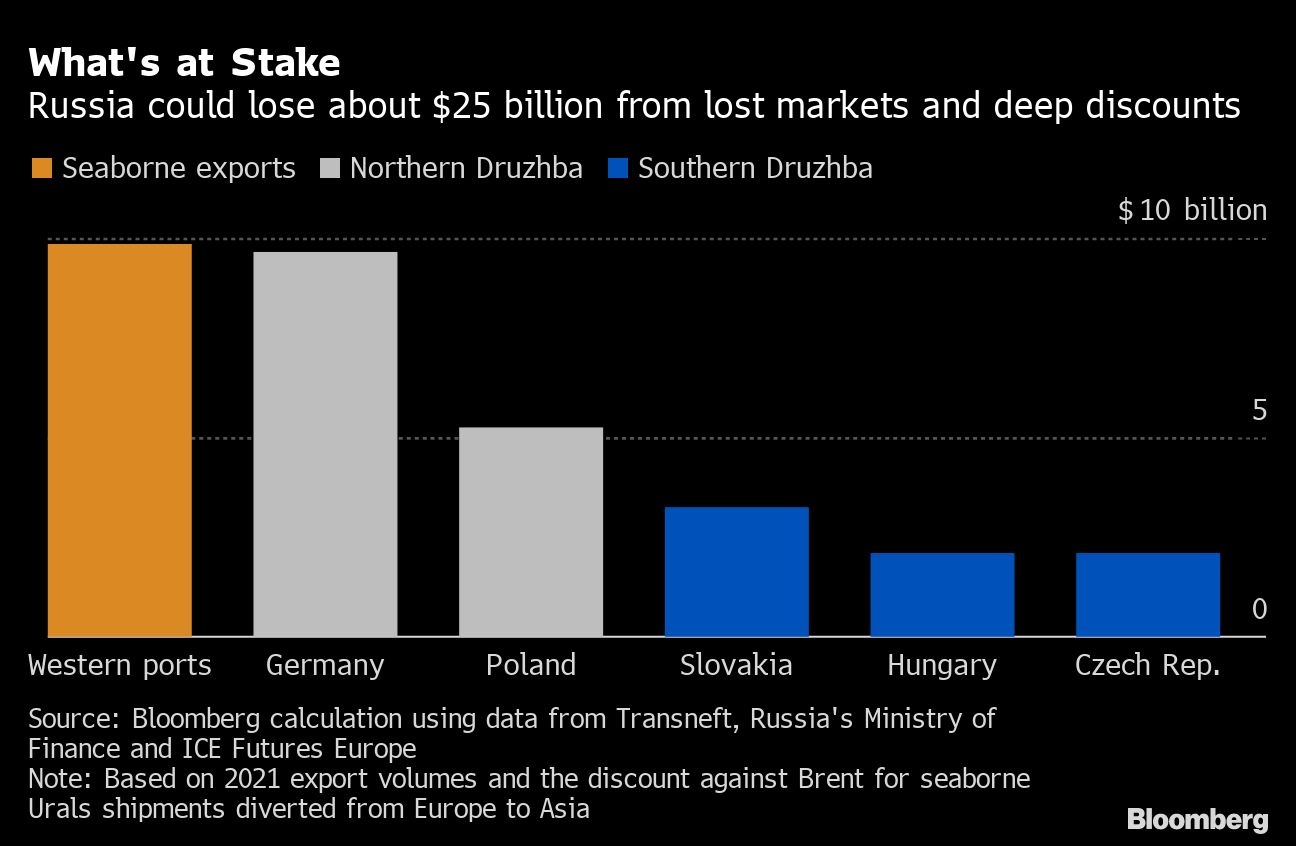May 30, 2022
EU leaders back push to ban some Russian oil over Putin's war
, Bloomberg News
G-7 Leaders Commit to Banning Imports of Oil From Russia
European Union leaders agreed to pursue a partial ban on Russian oil, paving the way for a sixth package of sanctions to punish Russia and its president, Vladimir Putin, for the invasion of Ukraine.
The sanctions would forbid the purchase of crude oil and petroleum products from Russia delivered to member states by sea but include a temporary exemption for pipeline crude, European Council President Charles Michel said late Monday during a summit in Brussels.
“This immediately covers more than 2/3 of oil imports from Russia, cutting a huge source of financing for its war machine,” Michel said in a tweet. “Maximum pressure on Russia to end the war.”
Officials and diplomats still have to agree on the technical details and the sanctions must be formally adopted by all 27 nations. Hungary, which will continue to receive Russian oil via pipeline, had been blocking an embargo for the past month as it sought assurances its energy supplies wouldn’t be disrupted.
The European Commission has proposed to ban crude oil six months from inaction, while refined petroleum products would be halted in eight months, according to people familiar with the most recent version of the proposal. Shipments of oil through the giant Druzhba pipeline to central Europe will be spared until a technical solution is found that satisfies the energy needs of Hungary and other landlocked nations.
Seaborne supplies account for about two-thirds of Russian oil imports, and once in place, the measure would cost Putin up to US$10 billion a year in lost export revenue, according to Bloomberg calculations. That’s because the ban would force Russia to sell its crude at a discount to Asia, where it’s already changing hands at about US$34 a barrel cheaper than the price of Brent futures.

The package also proposes a ban on insurance related to shipping oil to third countries, but it won’t take effect until six months after the adoption of the measures, from the previously proposed three-month transition, the people said. That adds to a longer list of concessions since the proposal was originally put forward by the EU’s executive arm in May.
The EU’s efforts to limit price spikes and Russia’s ability to divert its oil exports in the event of a European embargo had already been watered down in earlier negotiation rounds after a plan to ban tankers from transporting oil to third countries was abandoned.
A plan to ban Russians from purchasing real estate in the EU was dropped from the deal, according to a person familiar with the negotiations. Haggling over the terms of the EU’s oil embargo also led other member states to seek exemptions.
Some countries will also have a longer transition for the seaborne oil ban. For Bulgaria, a transition period until June or December 2024 is envisioned, while Croatia could get an exemption for imports of vacuum gas oil, which is used to make products including gasoline and butane.
Russia shipped about 720,000 barrels a day of crude to European refineries through its main pipeline to the region last year. That compares with seaborne volumes of 1.57 million barrels a day from its Baltic, Black Sea and Arctic ports.
However, the bulk of the pipeline deliveries are to Germany and Poland, which have signaled they will wean themselves off Russian supplies regardless of any EU action. Berlin committed in writing to stick to that pledge earlier on Monday, one of the people said.
Other measures in the proposed EU sanctions package include:
- Cutting three more Russian banks off the SWIFT international payments system, including Russia’s largest lender Sberbank.
- Banning the ability to provide consulting services to Russian companies and trade in a number of chemicals.
- Sanctioning Alina Kabaeva, a former Olympic gymnast who is “closely associated” with Putin, according to an EU document; and Patriarch Kirill, who heads the Russian Orthodox Church and has been a vocal supporter of the Russian president and the war in Ukraine. Hungary, however, is opposed to sanctioning Kirill, the people said.
- Sanctioning dozens of military personnel, including those deemed responsible for reported war crimes in Bucha, as well as companies providing equipment, supplies and services to the Russian armed forces.




